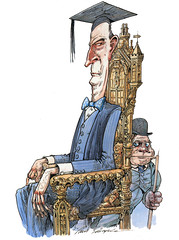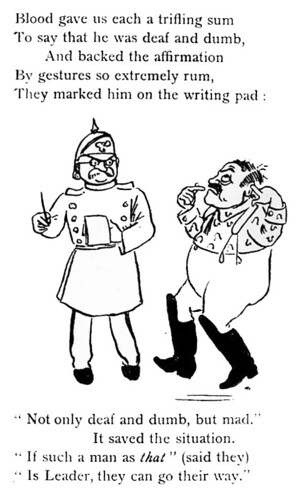On George W. Bush
I. On Knowledge
His had been an intellectual decision founded on his conviction that if a little knowledge was a dangerous thing, a lot was lethal.I turned to Tom Sharpe expounding on knowledge a quarter century ago for insight on the 43rd President of the United States. At first glance, I thought his bons mots were a succinct and definitive summary of what we have seen of said President's attitude towards knowledge. Some have speculated about oedipal reasons or ice queen mothering for his essential incuriousity. I demur; one should give him the benefit of the doubt and ascribe his outlook to conscious decision. He has asserted after all that he is "the decider". Also as Sharpe explained, incuriousity can be a deliberate policy, indeed one founded on conviction, if not an instinct towards self-preservation. This is only human and it is clear that there is a lot of conviction in the President. Upon reflection then, Sharpe's formulation can only be a partial rendering.
— Tom Sharpe - Porterhouse Blue
Knowledge is all the rage these days. Secretary of Defence, Donald Rumsfeld even proposed a taxonomy of knowledge, iconic in recent memory, in one his jawboning press conference performances — said taxonomy was incomplete as it turned out, he forgot the unknown knowns, and in the war policy he implemented, he discounted even the known knowns. Robert Waldmann recently added a few prescriptions on the matter. Political discourse in the United States of America has thus been all about knowledge: who knew what, when did they know it, should they have known it and so forth. There have even been acrobatics: "If I knew then what I know now, I would etc."
Well, who knew?
II. On Ignorance
It seems to me that one should turn to the other side of the coin in search of insight on the 43rd President of the United States. Thus we'll consider ignorance. For this we'll go back to 1907 and to Hilaire Belloc's delightful essay On Ignorance. As an avid proponent of the collage and remix, let's see how well a sampling of his toli can flesh out our portrait...
On Ignorance by Hilaire BellocIgnorance is an everyday occurence, something that affects every man. It isn't surprising that those who affect to be Everyman would not be immune from its effects.
There is not anything that can so suddenly flood the mind with shame as the conviction of ignorance, yet we are all ignorant of nearly everything there is to be known. Is it not wonderful then, that we should be so sensitive upon the discovery of a fault which must of necessity be common to all, and that in its highest degree? The conviction of ignorance would not shame us thus if it were not for the public appreciation of our failure.
... the biting shame of ignorance suddenly displayed conquers and bewilders us. We have no defence left. We are at the mercy of the discoverer, we own and confess, and become insignificant: we slink away.
... Note that all this depends upon what the audience conceive ignorance to be... Among very young men to seem ignorant of vice is the ruin of you, and you had better not have been born than appear doubtful of the effects of strong drink when you are in the company of Patriots...
One wonders about the moods of crowds. Why do people turn when they do? What is it that causes reassessments and shifts in the cultural zeitgeist? Tipping points are only part of the picture. I continue to ponder the essential difference between those two fables: the boy who cried wolf and the emperor's new clothes. This is not to suggest that the 43rd President of the United States is a wolf or indeed an emperor, although there may be latent aspirations to both characterizations. Rather I wonder about the reception to the messages of those boys in the fables. The one was ignored (he cried wolf too often) while the other was celebrated (everyone laughed at the emperor). When does danger or hubris become plainly evident to all? Perhaps everything is local and our evolutionary make-up conditions us accordingly.
But I digress. Back to ignorance...
Nevertheless... we should rather study the means to be employed for warding off those sudden and public convictions of Ignorance which are the ruin of so many.No one can fault the 43rd President of the United States for lack of passion. He is focused. He is a compassionate conservative. He is a war president. Passion and focus on big, serious and era-defining issues are his concern. War by definition is as big an issue as humankind faces. Would it that small things were considered; that however would reek of Clintonian microsteps, trivialities in essence.
These methods of defence are very numerous and are for the most part easy of acquirement. The most powerful of them by far (but the most dangerous) is to fly into a passion and marvel how anyone can be such a fool as to pay attention to wretched trifles...
No. Crusades. Mushroom clouds. War. Terror. Big picture. Serious.
There are other and better defences. One of these is to turn the attack by showing great knowledge on a cognate point, or by remembering that the knowledge your opponent boasts has been somewhere contradicted by an authority...The 2004 US presidential election campaign is perhaps a great illustration of this technique, and in this Karl Rove, sometimes labeled Bush's brain, was in full concurrence. John Kerry knows this all too well.
Yet another way is to cover your retreat with buffonery, pretending to be ignorant of the most ordinary things, so as to seem to have been playing the fool only when you made your first error. There is a special form of this method which has always seemed to me the most excellent by far of all known ways of escape. It is to show a steady and crass ignorance of very nearly everything that can be mentioned, and with all this to keep a steady mouth, a determined eye, and (this is essential) to show by a hundred allusions that you have on your own ground an excellent store of knowledge.The steady mouth, the determined eye, the repeated calls for resolve, the swagger, the obsession with fitness, the cowboy photo opportunities, the outdoors pose of a "Texan" stand in stark contrast to the Connecticut patrician upbringing. This is deliberate it would seem.
This is the true offensive-defensive in this kind of assault, and therefore the perfection of tactics...
The notion of buffoonery is trickier however. The public gaffes during the Queen's recent visit are a case in point. One should ask: is the steady flow of homespun awkwardness calculated or genuine? Dwelling on bushisms as many do, only serves to lower everyone's guard and cause misunderestimation as the 43rd President of the United States so candidly and memorably put it.
This is a theme Belloc covered a decade earlier in The Modern Traveller, a book whose toli I'm a year behind in addressing (real soon now).
Note the name, Blood, and the reaction to his shrewd manoeuvers:
It saved the situation.That is an efficient take on ignorance, who has the time to scrutinize closely in this fast-paced world? By and large, our decision-making is done on gut feel and liminal signals, with only lip service paid to due diligence. Most of the time things work out, right?
"If such a man as that" (said they)
"Is Leader, they can go their way."
Lastly, or rather Penultimately, there is the method of upsetting the plates and dishes, breaking your chair, setting fire to the house, shooting yourself, or otherwise swallowing all the memory of your shame in a great catastrophe.I fear that this is the terrain of the current moment; the aircraft carriers ominously deployed in the Gulf, the saber-rattling on Iran, Syria and such bode ill for all of us. Setting fire to the house, whether to its finances or its foundations is a real temptation. One school of thought on the Middle East misadventures is that if you break eggs over there, the natives will be scrambling amongst themselves. "We fight them over there so that etc". This Scrambled Egg Theory of Mesopotamia is a rather dubious historical legacy I must say. I rather thought that blood was precious for most human beings but it seems that a powerful cohort, and the 43rd President of the United States is among equals in these elite ranks, are determined to provide existence proofs of the quantity theory of insanity. This young century is on course to equal the butchery of its predecessor.
But that is a method for cowards; the brave man goes out into the hall, comes back with a stick and says firmly, "You have just deliberately and cruelly exposed my ignorance before this company: I shall therefore beat you soundly with this stick in the presence of them all."The closest we have come to this last method was when newly elected Congressman James Webb refused to shake the hands of the 43rd President of the United States. Decorum sadly did not allow the two to come to blows and thus provide catharsis one way or the other. Thus one must hold one's breadth until January 2009 keeping in mind, as his putative replacement has noted, that "the last throes can still be a violent period, the throes of a revolution".
This you then do to him or he to you, mutatis mutandis, ceteris paribus; and that is all I have to say on Ignorance.
The great contribution of American capitalism to the world is the notion that the customer is always right. In a London shop over the weekend, I was reminded that such a sentiment is not a cultural universal (don't ask). Indeed rhetoric can often be alienated from practice, witness no child left behind, heckuva job and so forth. In this vein, the popular majority that the 43rd President of the United States received in the 2004 elections causes me to discount the buyer's remorse that is the current, apparent collective hand-wringing. I actually agree with his notion that we've had an "accountability moment". Moreover, he was indeed clear about his intention of spending that capital. So yes, capital is being spent — in all forms. As to the rest, others can add their assessment. I omitted the dialog that Belloc provided out of a sense of dismay, it predicted too closely the discourse we have been treated to.
So, the 43rd President of the United States leads with his notions on knowledge and seems to be assiduously applying all of Belloc's playbook on ignorance. In this respect, he seems to be crossing the line from genial, if miscreant, rogue to fallen angel in the eyes of the American public. I suspect that this judgement, a fallen angel, is one he would be comfortable with. For my part, I only see Blood, but I have a jaundiced outlook on these things. All power to him I suppose, and history will tell the sorry tale. And that is all I have to say on George W. Bush.
Soundtrack for this note
- Gil Scott-Heron - A Legend in his own Mind
No comment. - Manu Dibango - Bush
A little Afrobeat and jazz-funk excursion taken from the maestro of Makossa's 1975 original soundtrack to Countdown at Kusini. It's nothing too light nor indeed too deep. The bassline and driving horns are augmented by some demented guitar as the band steadily ratchets up the tension building towards the inevitable crash at the end.


